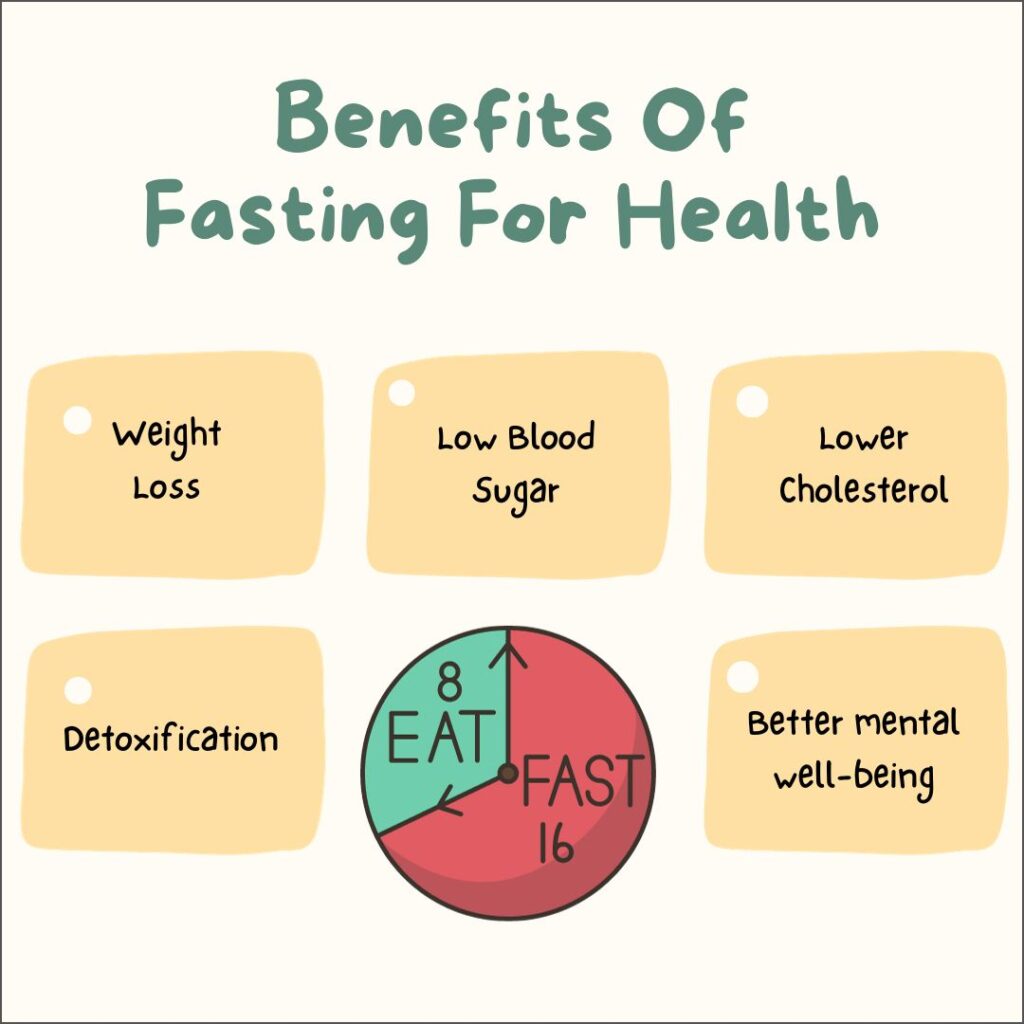Introduction
Intermittent fasting (IF) refers to structured eating patterns that cycle between periods of eating and fasting. Unlike calorie-counting diets, IF focuses on when to eat rather than what to eat. Common methods include the 16/8 approach (fasting 16 hours, eating within 8), the 5:2 diet (two low-calorie days each week), and alternate-day or extended fasting.
The Science-Backed Benefits of Intermittent Fasting
IF isn’t just a trend -it has roots in scientific studies:
Circadian alignment and hunger control
Aligning eating windows with natural day–night cycles may optimize digestion, reduce cravings, and support metabolic health.Business InsiderThe Sun
Weight and metabolic health
IF can yield weight loss similar to continuous calorie restriction with comparable effects on blood sugar control, lipid profiles, body weight, and insulin sensitivity.PMCHarvard Health+1WikipediaNP JournalCleveland ClinicBusiness Insider
Heart and chronic disease markers
Research points to improvements in blood pressure, cholesterol, inflammation, and longevity. Fasting may also boost brain health, autophagy, and reduce risks associated with neurodegenerative and metabolic diseases.Johns Hopkins MedicineMayo ClinicCleveland ClinicVerywell Health York Post
Cellular-level advantages
IF activates beneficial metabolic pathways—like AMPK and suppression of mTOR—triggering autophagy, enhanced oxidative defenses, and tissue repair.PMCJohns Hopkins Medicine

Who Stands to Benefit Most from IF?
- Overweight or obese individuals aiming for weight loss and improved metabolic markers.PMCHarvard HealthWikipediaBusiness Insider
- Those with insulin resistance, metabolic syndrome, high blood sugar, or dyslipidemia are seeking non-drug strategies.Johns Hopkins MedicineMayo ClinicBusiness InsiderVerywell Health
- Individuals interested in heart health, brain function, or longevity, especially through moderate IF regimens like 14/10 or 16/8.Johns Hopkins MedicineCleveland ClinicNew York PostVerywell Health
- People who value simplicity and lifestyle fit, since IF avoids tracking calories and fits flexibly into daily routines.ass General Brigham
Who Should Avoid or Be Cautious About IF?
- Children, teens, and older adults due to developmental or health-related vulnerability.Johns Hopkins MedicineWikipedia
- Pregnant or breastfeeding women—fasting can compromise nutrient intake essential for growth and development.Johns Hopkins MedicineMedStar Health
- Individuals with type 1 diabetes or on insulin face risks of hypoglycemia; no safe evidence yet supports IF.Johns Hopkins Medicine
- Those with a history of eating disorders or prone to disordered eating—IF can exacerbate unhealthy patterns.Johns Hopkins MedicineHealthlineMedStar HealthWikipedia
- Women of reproductive age or athletes—IF may disrupt menstrual cycles and hormonal balance if calorie intake is insufficient.HealthlineThe Times
- Individuals with heart conditions—extremely short eating windows (<8 hours) may be associated with increased cardiovascular risk.The Times of IndiaThe Economic TimesMayo ClinicMass General Brigham
- Anyone with a chronic illness, blood sugar disorders, or taking medications should consult a healthcare provider before starting IF.Harvard HealthMedStar HealthMayo Clinic
How to Get Started Safely
- Consult your healthcare provider first, especially if you have any existing health conditions.Johns Hopkins MedicineMedStar Health
- Start with a gentle schedule, like the 12-hour fast (e.g., 7 pm to 7 am), then progress to 14/10 or 16/8 most adaptively.U-M School of Public HealthCleveland ClinicMedical News Today
- Prioritize nutrition and hydration—plenty of protein, healthy fats, fiber-rich foods—and consume water or zero-calorie beverages during fasting.Johns Hopkins MedicineMedical News TodayHealthlineCleveland Clinic
- Incorporate resistance training and protein to preserve lean mass during weight loss.PMC
- Tools for acclimation—expect hunger or irritability initially; stay hydrated, and ease into exercise timing.New York PostHealthline
- Practice moderation—avoid extreme schedules like <8-hour eating windows or prolonged fasts without guidance, which may pose risks.The Times of India+1New York Post+1

Conclusion
Intermittent fasting can be a powerful, flexible tool for weight loss, metabolic health, and overall well-being—but it’s not universally suitable. If you’re healthy, overweight, and seeking a lifestyle-based strategy, IF (especially moderate methods like 14/10 or 16/8) may be worth trying. However, individuals who are young, female and reproductive-age, pregnant, diabetic type 1, or with eating disorder history should avoid it or proceed under care.
As always, the best approach is personalized, balanced, and aware—supported by healthcare advice and solid nutrition. Let me know if you’d like a visual guide, a comparison table of IF methods, or help structuring a content calendar!

FAQs
1. Is intermittent fasting better than calorie-counting for weight loss?
Studies indicate that intermittent fasting delivers weight loss and metabolic improvements comparable to calorie-restricted diets. One year-long study found no significant difference between time-restricted fasting and daily calorie restriction when overall intake was controlled.Harvard Health
2. Can intermittent fasting harm heart health?
Moderate time-restricted eating (e.g., 12–16 h fasting) may improve blood pressure, cholesterol, and inflammation. However, very tight windows under 8 hours have been linked in some studies to higher cardiovascular mortality risk. Balance and moderation are key, especially for those with heart conditions.The Times of IndiaThe Economic TimesMayo ClinicMass General Brigham
3. Is intermittent fasting safe for women trying to conceive or athletes?
IF may disrupt menstrual cycles or hormonal balances if calorie intake is insufficient. It may also affect energy availability in athletes. Women in this group should proceed cautiously, ensure adequate nutrition, and consult professionals before beginning.HealthlineThe Times
